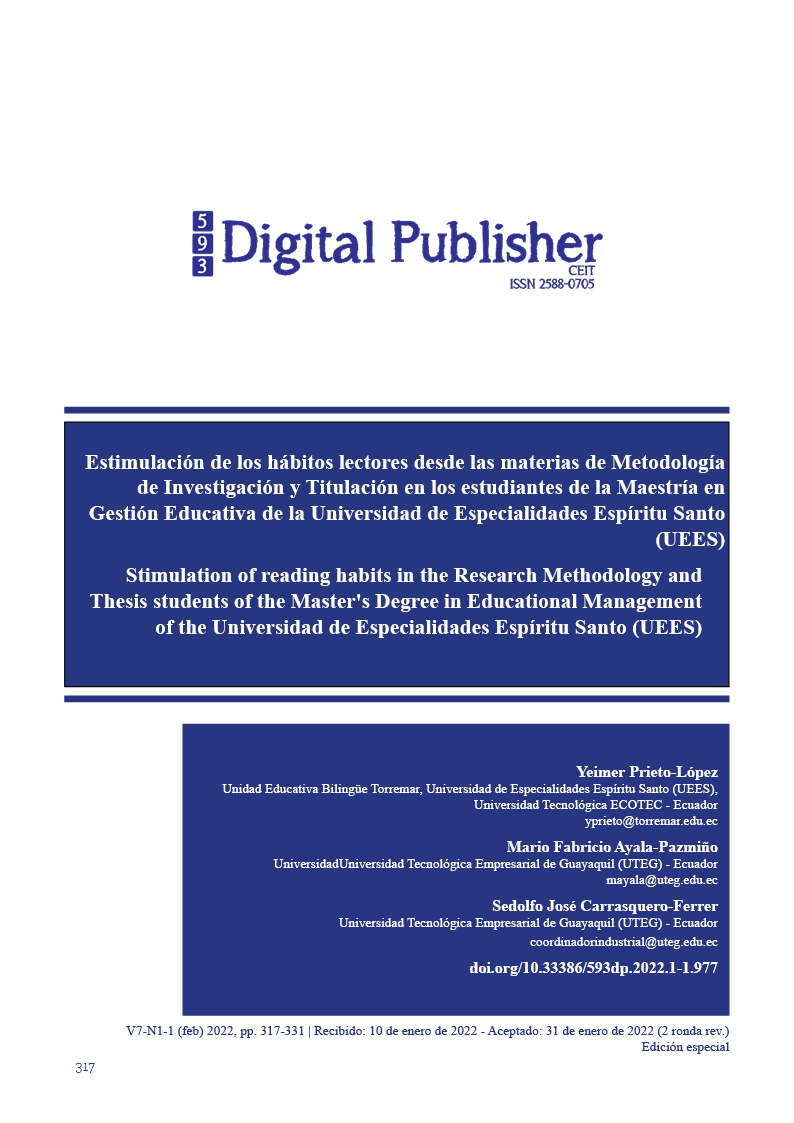Estimulación de los hábitos lectores desde las materias de Metodología de Investigación y Titulación en los estudiantes de la Maestría en Gestión Educativa de la Universidad de Especialidades Espíritu Santo (UEES)
Contenido principal del artículo
Resumen
Esta investigación resulta de la experiencia de los investigadores durante tres años consecutivos dictando la materia de Metodología de la Investigación (MR) en la Maestría en Gestión Educativa (MDEM) de la Universidad Espíritu Santo (UEES), detectando los malos hábitos lectores como una de las principales limitantes en los estudiantes. Existe la necesidad de profundizar el componente lector y la producción científica y académica, evidenciado por el diagnóstico aplicado en las diferentes promociones del 2019 al 2022.
Para su desarrollo se consultó una extensa bibliografía considerando los vacíos en la investigación y la enseñanza relacionada con la lectura y la necesidad de incentivar a los estudiantes a leer. La aplicación de diferentes instrumentos científicos a los estudiantes del MDEM permitió diseñar estrategias metodológicas para estimular y desarrollar hábitos lectores en los estudiantes. La factibilidad de la propuesta fue evaluada y resultó en treinta publicaciones de estudiantes en diferentes revistas científicas indexadas, lo que demuestra la pertinencia e impacto de la investigación realizada en el contexto universitario.
Descargas
Detalles del artículo

Esta obra está bajo una licencia internacional Creative Commons Atribución-NoComercial-CompartirIgual 4.0.
1. Derechos de autor
Las obras que se publican en 593 Digital Publisher CEIT están sujetas a los siguientes términos:
1.1. 593 Digital Publisher CEIT, conserva los derechos patrimoniales (copyright) de las obras publicadas, favorece y permite la reutilización de las mismas bajo la licencia Licencia Creative Commons 4.0 de Reconocimiento-NoComercial-CompartirIgual 4.0, por lo cual se pueden copiar, usar, difundir, transmitir y exponer públicamente, siempre que:
1.1.a. Se cite la autoría y fuente original de su publicación (revista, editorial, URL).
1.1.b. No se usen para fines comerciales u onerosos.
1.1.c. Se mencione la existencia y especificaciones de esta licencia de uso.
Citas
Álvarez, D. (2018). The animation to reading: a manual of action and reflection. Medellín: University of Antioquia. 20(65), 91-98. https://www.redalyc.org/pdf/356/35646429010.pdf
Cardenas, L. (2017). Reading and Writing Internships at The University: What and How Do Undergraduate Students Read and Write? Amauta, 11(21), 139-162. https://dialnet.unirioja.es/servlet/articulo?codigo=7763685
Cassany, D. (2017). Reading comprehension. pp. 193–256. In Teaching Language. Barcelona. Ed. Grau.
Castro, M. (2019) Learning environments. University of the North, Atlantic https://dialnet.unirioja.es/servlet/articulo?codigo=7069222
Ciuffo, M., Myers, J., Ingrassia, M., Milanese, A., Venuti, M., Alquino, A., & Gagliano, A. (2017). How fast can we read in our minds? Developmental trajectories of silent reading fluency. Reading and Writing, 30(8), 1667-1686. https://link.springer.com/article/10.1007%2Fs11145-017-9744-2
Del Valle, V. (2017). The act of reading: an experience in Primary Education. Educere,
Durango, Z. (2018). Reading and its types. Word Portal, (1), 9-13.
Flores-Guerrero, D. (2017). The importance and impact of reading, writing, and critical thinking in higher education. Nearby zone, (24), 128-135. http://www.scielo.org.co/scielo.php?script=sci_arttext&pid=S2145-94442016000100010
García-Alzola, E. (2017). Some aspects of reading. In Language and Literature: its teaching at the middle level. Havana: Ed. Education. p. 103.
Gorman, K. S. (2017). The Reading Processes. In New Perspectives on reading and writing processes, p. 18.
Guardiola, E., Baños, J. (2021). Reading during the covid-19 pandemic. Magazine of
Guerrero, J., & Ponce de León, R. (2018). The formation and development of the reading habit in Cuba. Opuntia Brava, 8(3), 25-32. http://200.14.53.83/index.php/opuntiabrava/article/view/259
Henríquez-Ureña, C. (2019). Invitation to reading. Havana: Ed. People and Education. Q.14
http://revistas.curn.edu.co/index.php/portaldelaspalabras/article/view/589/44
Jiménez, M., Fierro, B., & García, A. (2016). Reading and its promotion from different pedagogical scenarios. Revista amauta, 14(28), 25-36. http://investigaciones.uniatlantico.edu.co/revistas/index.php/Amauta/article/view/1603Benítez, M. (2017). The family from the traditional to the debatable. News in population, 26. 58-68. rnp050217.pdf (sld.cu)
Julio, G. (2017). Is it important to publish the results of scientific research? Journal of the Selva Andina Biosphere, 5(1), 65-66. http://www.scielo.org.bo/scielo.php?pid=S2308-38592017000100008&script=sci_arttext
Leyva-Hernández, E. (2018). Alternative for the preparation of families in the formation of reading habits of Students of Basic Secondary. 156p. Thesis in master’s option in educational research). ISP: “José de la Luz y Caballero”, Holguín.
Mañalich, R. (2017). The teaching of literary analysis. Havana: Ed. People and Education. p. 23. Medicine and cinema. 16, 7-12. https://revistas.usal.es/index.php/medicina_y_cine/article/view/rmc202016e0712
Perez, I. (2017). Reading habits today: some considerations. In Education No. 104. Sep-Dec. p.33-35.
Pupo, N. (2018). Read as a family. Havana: Ed. Gente Nueva, p. 8.
Rodríguez-García, B. (2018). Proposal of activities to develop the reading and oral expression of the students with the use of the texts of the Editorial Libertad Program. 97h. In Master’s Thesis. Gibara.
Sacristán, R. (2017). Read to learn. In Education. No. 118. may.-Augst. p. 2-15.
Salazar, M. (2019). Methods of learning literacy. Peru: Ed. Fondo Editorial del Pedagógico San Marcos-Instituto de Ciencias y Humanidades, 2005. 130p.
Venegas, G. (2019). Motivation (according to Maslow’s Theory) and reading habit in students of the second grade of secondary school in the IE “Sacred Heart of Jesus” of Cusco, [Thesis, Universidad Nacional Pedro Ruiz Gallo]. http://repositorio.unprg.edu.pe/handle/UNPRG/8162
Verde, Ana M. (2017) The challenge continues: to facilitate communication. In Education #118, May-August p. 32.




